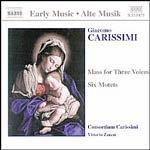
Mass for Three Voices / Six Motets
 $25.00
Out of Stock
$25.00
Out of Stock6+ weeks add to cart
CARISSIMI
Mass for Three Voices / Six Motets
Consortium Carissimi, Vittorio Zanon
[ Naxos Early Music / CD ]
Release Date: Wednesday 15 May 2002
This item is currently out of stock. It may take 6 or more weeks to obtain from when you place your order as this is a specialist product.
Carissimi was one of the early masters of the oratorio
"The performances by the singers of Consortium Carissimi are solid if not revelatory. There are occasional lapses in articulation and, at times, excessive use of vibrato, but not enough to diminish the overall excellence of the program. The instrumental accompaniment-gamba, violone, organ, and theorbo-is suitably reserved but never lacking character. All in all, this is a good recording well worth your attention, especially at its budget price."
- Craig Zeichner Fanfare November/December 2001
"The three male voices are refreshingly uncluttered, virtually undisturbed by vibrato, with impeccable intonation. Particularly striking is the tenor taking on an alto role with a light 'haute-contre' quality. Instrumental continuo is similarly colorful, ringing the changes of theorbo, organ and harpsichord."
- George Pratt BBC Music Magazine August 2001
Born in 1605, in the small Roman hillside town of Marino, Giacomo Carissimi began his career as a chorister and organist in Tivoli in the years between 1623-1627. In the two years that followed, he was organist and then maestro di cappella at the Cathedral of San Ruffino, which he left at the invitation of the rector of the Collegio Germanico Hungarico in Rome to become maestro di cappella of the already prestigious Basilica of Sant'Apollinare which was associated with the College. Here he would remain for the rest of his life. The Basilica of Sant'Apollinare had already established itself as a centre of excellence for liturgical music in Rome, and the presence of Jacomo, as he is remembered in archive documents, brought it even greater attention. Carissimi taught music to the students of the college and privately to such musicians as Kerll, Baudrexel, Bernhard and Charpentier. He also took part in the musical activity of the Confraternity of the Santissimo Crocifisso at San Marcello. Among the numerous proposals of employment made to him over the years, he only accepted Queen Christina of Sweden's offer in 1656 to become her maestro di cappella da camera, rejecting offers to serve as Kapellmeister at the court of the Archduke Leopold Wilhelm in Brussels and ignoring attempts to persuade him to succeed Claudio Monteverdi at the Basilica of San Marco in Venice. He died on 12th January 1674 and was buried in his beloved Basilica of Sant'Apollinare.
Carissimi's talent was soon recognised by his Roman contemporaries and brought him long-lasting admiration throughout Europe. Such success was not accorded his manuscript compositions, which he left to the college at his death. Pope Clement X, in fact, prohibited the lending, transfer, sale or publication of his music. Today almost all autograph manuscripts are lost, perhaps owing in part to the destruction brought on by the two French occupations of Rome. Those manuscripts which survive are copies, not autographs, which were produced solely for performance by Carissimi's students, providentially preserving a large number of his compositions.
All the manuscripts transcribed by Consortium Carissimi are, therefore, copies themselves, made by Carissimi's contemporaries; consequently little information comes directly from the music other than the text itself as to where and in what circumstances this music was performed. At the Oratory of the Santissimo Crocifisso, the Confraternity of the same name was active from 1568 to 1725, creating a tradition of such excellence in performances of sacred music that its influence was fundamental for the musical genre known today as the Oratorio. This para-liturgical form consisted of Old and New Testament readings and a sermon, interspersed with vocal and instrumental music. From the simple Lauda, which was already common in the Spiritual Exercises at the Oratory of Filippo Neri (S. Maria in Vallicella), to the production of more elaborate and complex motets, the Oratory involved professional musicians and composers, who fully immersed themselves in the spiritual ferment of the Catholic Counter-Reformation. These artists not only produced beautiful music, but music which involved the listener in the content of the texts, edifying those assembled through the sense of hearing.
The Missa a tre (Mass for three voices) is a prime example of Carissimi's genius in setting to music the Ordinary of the Mass, the Kyrie, Gloria, Credo, Sanctus and Agnus Dei. Carissimi entrusts these three voices and a simple figured bass accompaniment with the task of bringing to life the text of the liturgy. In the vocal solo passages as in the homo-rhythmic and interwoven counterpoint he employs all his musical genius in the creation of a unique composition, otherwise unknown to the seventeenth century. These various musical styles are to be found in his more elaborate motets and in his splendid oratorios. The Agnus Dei in the manuscript finishes with one miserere only. We have kept this version but have added an instrumental verse, repeating the Agnus Dei twice and ending with the text dona nobis pacem.
The present recording is completed by six characteristic examples of Carissimi's motets, set for the same vocal ensemble as the Mass. Whether these motets were heard in the liturgies of Sant'Apollinare or in the Spiritual Exercises at the Oratorio del Crocifisso it is difficult to say. The compositional style and exclusive use of Biblical texts, however, would lead us to consider seriously this second hypothesis.
- Garrick Comeaux
Tracks:
Mass for three men's voices and basso continuo
01. Kyrie 03:30
02. Gloria 07:22
03. Credo 12:34
04. Sanctus 02:32
05. Agnus Dei 02:11
Motets
06. Desiderata nobis 04:13
07. Confitemini domino 03:11
08. Ecce nos reliquimus 07:43
09. Qui non renuntiat 05:57
10. Turbabuntur impii 07:03
11. Vidi impium 05:10


